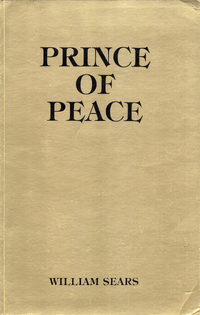The Bahá’í teachings, encapsulated profoundly in the writings of Bahá’u’lláh, herald significant themes and concepts that resonate deeply within the spiritual and socio-political fabric of contemporary society. One of the most compelling of these themes is the notion of peace, particularly as articulated in the affectionate epithet “Prince of Peace.” This designation is not merely a title, but a reflection of Bahá’u’lláh’s vision for a harmonious global civilization, rooted in principles of love, unity, and justice.
At the heart of Bahá’u’lláh’s teachings lies an unequivocal commitment to world peace. He asserts that peace is not only the absence of conflict but a dynamic state of being that necessitates the active engagement of individuals, communities, and nations. The allure of Bahá’u’lláh’s message stems from its universal applicability; it addresses the pervasive longing for tranquility felt by humanity amidst the clamor of strife and discord. In a world rife with divisiveness, the Bahá’í Faith invites an examination of the conditions that engender conflict and presents a framework for transcending them.
The historical context of Bahá’u’lláh’s life further underscores the profundity of his message. Born in mid-nineteenth century Persia, he witnessed firsthand the tumult of sectarian violence, oppression, and social upheaval. These experiences served as a crucible for his profound insights into human nature and the requisite steps for societal transformation. Thus, his declaration as the bearer of a new divine revelation becomes an emblem of hope for those yearning for change. The title “Prince of Peace” reflects this ethos, imbuing his teachings with a sense of purpose that transcends mere ideology.
Central to Bahá’u’lláh’s teachings is the assertion of the oneness of humanity. This fundamental principle asserts that all men and women, regardless of their socio-economic, cultural, or religious backgrounds, are the offspring of a singular Source. Such an understanding cultivates a spirit of kinship that is indispensable for fostering peace. Furthermore, the acknowledgment of our shared humanity engenders empathy, a vital precursor to any meaningful dialogue aimed at conflict resolution. The Prince of Peace thus advocates for a radical reorientation of societal norms; he implores a collective shift from notions of separateness to an embrace of unity.
Another critical aspect of Bahá’u’lláh’s teachings centers around the principles of justice and equity. He articulates that true peace can only be realized when justice prevails. The Bahá’í Faith posits that social and economic inequalities are intrinsically linked to discord and strife. By striving for equitable systems that foster opportunity and well-being for all, individuals can help create a foundation upon which lasting peace can be established. The Prince of Peace’s call to action urges individuals not to merely reflect upon their aspirations for harmony but to actively participate in the betterment of society through just means.
Education also takes a pivotal role within Bahá’u’lláh’s vision for a peaceful society. The teachings underscore that knowledge is a radiant source of light, illuminating the path toward understanding and cooperation. In a world where ignorance often leads to mistrust and enmity, the Bahá’í emphasis on universal education becomes a transformative tool. Striving toward an educated populace facilitates the cultivation of critical thinking, empathy, and the ability to engage in constructive discourse. The Prince of Peace thus frames education not merely as a right but as a prerequisite for the establishment of a peaceful and just society.
Moreover, the promotion of equality, particularly gender equality, is integral to Bahá’u’lláh’s teachings. Empowering women is recognized as essential to achieving social stability and peace. The recognition that women and men possess equal capacities and rights is pivotal in dismantling long-standing social barriers that perpetuate division. Bahá’u’lláh proclaims that the advancement of women is synonymous with the advancement of society. This radical re-evaluation of gender dynamics illustrates the multifaceted nature of peace as articulated by the Prince of Peace; it is not a peripheral concern but rather a cornerstone of sustainable development.
The concept of consultation also features prominently in Bahá’u’lláh’s writings. He emphasizes the importance of collective decision-making as a means to enhance unity and coherence among diverse groups. Consultation, when conducted with sincerity, equanimity, and respect for differing opinions, becomes a catalyst for understanding. This practice embodies the essence of the Prince of Peace’s vision, wherein dialogue replaces discord, and cooperation triumphs over conflict.
The global applicability of these teachings is manifest in the modern world’s challenges. Issues such as climate change, poverty, and social injustice can be reframed within the Bahá’í perspective, positing that collective action grounded in love and unity is crucial for addressing these pressing concerns. The universality of Bahá’u’lláh’s principles serves as a beacon of hope, urging humanity toward achieving a state of collective peace amidst climatic adversity and political turbulence.
Ultimately, the legacy of Bahá’u’lláh as the Prince of Peace serves as a powerful reminder of the transformative potential of spiritual teachings in addressing the urgent dilemmas of contemporary society. His insights call for a reimagining of interpersonal and international relations, emphasizing that peace is an active pursuit that necessitates the participation of all individuals. The pathway to peace, illuminated by the principles of unity, justice, and education, transcends individual aspirations, inviting humanity into a collective odyssey towards an enduring, harmonious existence.
